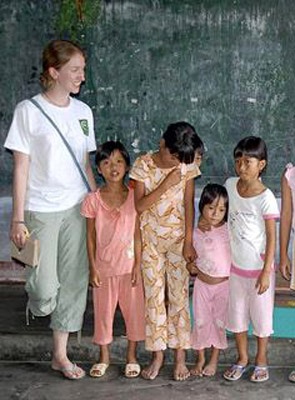Community Profiles
Laura Chirot

Profile first published on the Political Science website
“MIT’s globalization research is really cutting-edge, and it addresses questions that are deeply relevant for developing economies.”
Laura Chirot
Political Sciences doctoral candidate
Three years ago, Laura Chirot was living in Vietnam, a place she had fallen for in college and had returned to year after year. This time, she’d traveled there to do policy research.
As part of her work, she became engrossed with recent globalization studies by MIT political scientists. For instance, she read the work of Suzanne Berger, Raphael Dorman-Helen Starbuck Professor of Political Science, who performs extensive qualitative fieldwork to make revelations in thinking about outsourcing, competition and innovation.
This work caught Chirot’s eye because of its connections to the real lives of people in developing nations, the very same connections that had enchanted Chirot with Vietnam in the first place.
Suddenly, Chirot was committed to a new destination: MIT.
Industrial policy in late-developing countries
Now in her second year of doctoral studies in political science at MIT, Chirot is doing similar fieldwork as part of a joint project with the World Bank and the Korean Development Institute to examine industrial policy in late developing countries, including Vietnam, China, Malaysia and Brazil. Working with Edward Steinfeld, professor of political economy, Chirot has traveled to Vietnam twice in the past year for interviews with business people there to understand the forces that encourage and hinder economic development.
The lure of Vietnam
Chirot first fell for Vietnam in 2006 during a grant-funded summer trip to teach orphans in central Vietnam to speak English. She had spent the previous year doing foundational reading — Marx, Weber, Smith, Durkheim — as a college sophomore in Harvard’s interdisciplinary Social Studies program.
As a result, Vietnam resonated with meaning. “I saw a mix of communism, rapid industrialization and a change toward a market economy occurring very visibly on the ground, concretely connecting these theories about modernization that I had been reading,” she says. “I was hooked.”
So hooked that she spent the next semester — a semester abroad living in Paris — learning to speak Vietnamese.
Chirot returned to Vietnam the next summer to work with humanitarian demining organizations in the former DMZ, where land mines and unexploded ordnance clot fields and yards and still kill and maim people today. “I was really affected by meeting these people,” she says.
Advocacy to ban landmines
After graduation, Chirot moved to Washington, DC, to work on an advocacy campaign to ban cluster munitions and landmines. She then returned to Vietnam to do research. “I wanted to understand the sources of Vietnam’s two decades of rapid economic growth, and to know what aspects of those were replicable for other developing countries,” she says.
At the Harvard Kennedy School’s Fulbright School in Ho Chi Minh City, she investigated higher education reform in Vietnam. She found that everyone agreed on educational reform, yet progress remained stalled.
She wanted to understand why. Though she had never before considered pursuing a PhD, her questions, along with the influence of researchers such as Berger, led her to apply to MIT to study political science. “MIT’s globalization research is really cutting-edge, and it addresses questions that are deeply relevant for developing economies,” says Chirot.
The missing middle: mid-sized companies
As part of her research with Steinfeld at MIT, Chirot has interviewed CEOs and managers of firms to study the problem of the “missing middle,” the idea that, in the developing world, there are loads of small and micro-enterprises, but few medium-sized, upwardly mobile companies. Without these mid-sized companies, developing economies will struggle to build the large firms that are essential for development because they can compete globally.
Through her interviews, Chirot has discovered that Vietnam has a handful of mid-sized private sector companies in a variety of fields, including aquaculture, consumer products and online businesses — sectors where the state and its official industrial policy are largely absent, suggesting that the middle isn’t completely missing, but also that it is imperiled by government indifference.
Chirot hopes the work will lead to a thesis topic and, ultimately, a career that blends research, policy work, and, no doubt, many more trips to Vietnam.